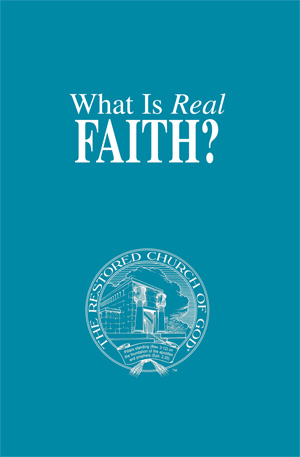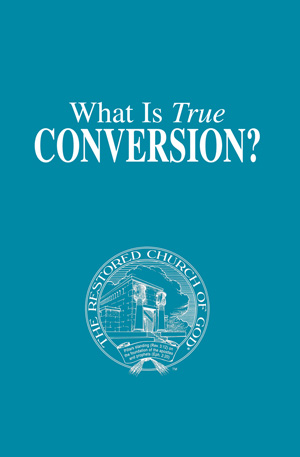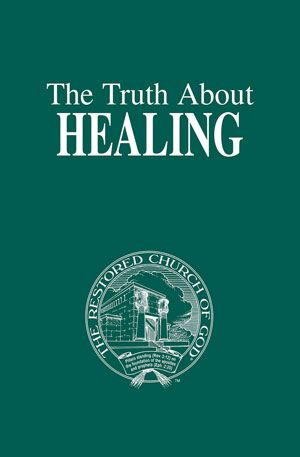The Bible states that “without faith it is impossible to please [God]” (Heb. 11:6). This is an incredible statement—yet, it is in the Bible! Take it for exactly what it says. Just think! Anything a person does, in attempting to be Christian, means absolutely nothing, if he lacks faith. For without faith, he has no hope—no possibility of pleasing God. Any who are not pleasing God are Christians in vain. That is serious! Consider yourself. Do you have real faith? Is it sufficient for salvation? Can you know? You can! This booklet will explain how.
A Lack of Real Faith
Through the years, people have often asked, “Mr. Pack, I lack faith. I do not feel the presence of God or His power in my life. How can I have more faith?”
What about you? Do you lack faith to know that God is with you? To overcome sin and guilt? To be healed of disease? To believe all things in His Word? Do you lack faith that “all things [will] work together for good” if you love God (Rom. 8:28)? To believe God will work out injustices you have received? To believe God will provide for you? To believe that you can endure severe trials and persecution? Or that God will deliver you from them? Do you lack faith to see the soon-coming kingdom of God more clearly and that you can be in it?
The Bible says that you need not lack faith in any of these areas! You can develop real faith. However, the Bible says that most people, in the age preceding Christ’s Return, will not have sufficient faith to confidently claim any of these or other promises from God’s Word!
Faith Found When Christ Comes?
This world is in trouble. Problems are escalating everywhere on a planet cut off from God. The Return of Christ‚ÄĒto restore the kingdom to Israel (Acts 1:6) and set up the Kingdom of God‚ÄĒis imminent.
When speaking of our time—the last generation before His Return—Christ asked, “When the Son of Man comes, shall He find faith on the earth?” (Luke 18:8). Think of the incredible implications of this question! Is it possible that true faith could be completely gone from earth at Christ’s Second Coming? Christ was able to look forward, into our time, and know that conditions would exist allowing this to be true—almost! (To learn more about HOW God‚Äôs Kingdom will come, read our booklet How God‚Äôs Kingdom Will Come ‚Äď The Untold Story!)
An article titled ‚ÄúKnow Your Bible? Many Christians Don‚Äôt,‚ÄĚ by reporter Wendy Griffith, discusses the issue of people‚Äôs ignorance of the Bible. Here is what she wrote:
‚ÄúIt‚Äôs clear that many Americans‚ÄĒincluding Christians don‚Äôt know their Bible. Just look at the numbers from a recent study:
- More than 60 percent of Americans can’t name either half of the Ten Commandments or the four Gospels of the New Testament.
- Some 80 percent including ‚Äėborn again‚Äô Christians believe that ‚ÄėGod helps those who help themselves‚Äô is a direct quote from the Bible.‚ÄĚ
What a shame! What a terrible indictment of the most blessed nation on earth. And it is the single greatest reason why so little genuine faith is to be found.
But Christ said that He would build His Church and He promised that it would never be destroyed (Matt. 16:18). His Church—God’s true Church—is where people do have true faith according to the Bible definition. Therefore, the presence of God’s true people on earth will ensure that at least a few people will be found to have faith when Christ returns. (Read our free booklet Where Is God‚Äôs Church?)
Notice Galatians 5:22-23: “But the fruit of the Spirit is love, joy, peace, long-suffering, gentleness, goodness, faith, meekness, temperance: against such there is no law.” We must establish another important point relating to the life of all true Christians. Real faith comes from the Spirit of God—it is a fruit of the Holy Spirit. No one can have it—or even be a true Christian—without God’s Spirit.
But what is faith? Surely God would not state that those lacking faith cannot possibly please Him—and then withhold the real definition of faith from all who seek to know it. Before examining what the Bible says about real faith, one must examine what people think it is.
Various Counterfeits
There are several common ideas about faith. If you doubt this, then merely ask a half-dozen people to explain it—to precisely define it for you. Be prepared for just as many different ideas—probably all of them wrong.
I have known many people who believed that faith is an intangible “feeling” that cannot be defined. It is often thought to be personal, mysterious and unique to each person. This feeling usually has no definition, structure, or clear purpose and, inevitably, is whatever people want or need it to be. In other words, for almost every person, there is a different description and definition of faith. It is strange how many people view faith this way, yet the Bible has never said anything of the sort.
Others believe that faith is some kind of “positive thinking.” It is as though as long as people take an optimistic view and remain upbeat about events and circumstances, they are demonstrating faith. The Bible nowhere describes faith with the words positive or optimistic—though these are certainly good qualities of mind.
Other views of faith are that it is hope or confidence. Neither is true! Hebrews 10:35 does say that confidence is important. Notice: “Cast not away therefore your confidence, which has great recompense of reward.” While this passage reveals that confidence is vital for Christians, confidence alone is not faith. Regarding faith being hope, I Corinthians 13:13 states, “And now abides faith, hope, charity [love], these three; but the greatest of these is charity [love].” If faith and hope are the same thing, why are they listed separately? Why does God refer to them as “these three”? When mentioned with love, shouldn’t He have said, “these two”? Obviously then, faith is different from hope.
Still others believe that one’s faith is the equivalent of the church denomination or affiliation they attend. This description of faith is seriously flawed and unscriptural. Notice Ephesians 4:4-5: “There is one body, and one Spirit, even as you are called in one hope of your calling; One Lord, one faith, one baptism…” If faith is a church denomination, and there are well over 2,000 different churches in the United States alone, then there cannot be just “one faith.” Of course, this idea would also make the apostle Paul wrong. He should have written that there are “thousands of faiths.”
Bear in mind that you have just seen in your Bible that there is only one kind of faith! We will soon explore whether the Bible precisely defines that one kind of faith or leaves it up to individuals to guess its meaning.
The last and perhaps most common idea is that faith is any general belief that Jesus died for your sins. As with the idea that faith is a feeling, the extent of people’s “personal” belief in the sacrifice of Christ becomes the deciding factor in how each professing Christian chooses to define it. Certainly we will see that the true definition of faith does include this important belief. There is no doubt that if someone does not believe the most basic understanding that Christ died for his or her sins, this person does not have saving faith. Remember, without faith it is impossible to please God, and if someone doubts Christ died for his sins, he certainly is not pleasing God and will not be saved! Believing that Christ died for your sins is a direction—an avenue—of faith, but not what faith is!
What Faith Is
It is now time for the most fundamental question in this booklet. Does the Bible give an exact definition of faith? Since it says there is one faith, does it, in fact, give one definition of that faith? Is there a place where the Bible says, “Faith is…” and a precise definition follows? If so, where is it, and what does it say?
Hebrews 11 has often been called the “faith” chapter. It describes many of God’s greatest servants and how their faith enabled them to perform great acts and miracles, or to endure severe trials. This long chapter is very inspiring, and all who want to have real faith should periodically read it. It contains the word faith two dozen times. Verse 2 says, “For by it [faith] the elders [these Bible figures] obtained a good report.”
How could they have obtained a “good report” unless they understood faith? Now for God’s definition in verse 1: “Now faith is the substance of things hoped for, the evidence of things not seen.” Did you notice that faith involves “evidence” of things “not seen”? The marginal rendering of “substance” is “assurance.” Faith involves an assurance “of things hoped for.” But, if something is hoped for, that something has not yet been received. Therefore, where faith is involved, there is an assurance that it will be received!
But how can evidence be related to something that is not seen? Do we not rather think of evidence as involving things that are seen?
In a courtroom, evidence is what can be proven. It involves facts visible to a jury. In other words, evidence only involves things that can be seen or demonstrated. How then can faith involve evidence that is invisible—not seen?
Faith involves evidence in the following way. Real faith, in any promise made by God, is actually the evidence. It is the belief that is the evidence. If God promises to do something, it is impossible for Him to lie (Heb. 6:18). Your evidence that He will perform it is the very unwavering faith that you hold. Do you understand this? Remember, Hebrews 11:1 said, “faith is…the evidence.” If you have true Christian faith, you do not need to search for the evidence—you already possess it!
The Doctrine of Faith
We have read the biblical definition of faith, but faith is also a doctrine. Notice: “The principles of the doctrine of Christ…of faith toward God…” (Heb. 6:1). Faith is always exercised toward God, but it is Christ who makes this possible.
Faith is something Christ teaches—this is why the Bible calls it “the doctrine of Christ.” By now, you realize that faith is important for all Christians to understand. You need not be confused about it, though people around you may be. We must eliminate the misunderstanding and deception about faith.
Perhaps when Christ returns, He will find real faith in you!
For every doctrine of God, there are endless ideas that people conjure up about it. The Bible explains what God says and thinks about His doctrines. If a doctrine comes from and belongs to God, we ought to examine what HE says about it. You should never be concerned with the opinions of people. The balance of this booklet will explain the Bible’s true teaching about the doctrine of faith toward God. Prepare to be surprised!
Not the Five Senses
Almost everyone believes that faith involves feelings. But physical feelings merely come from the human senses and have nothing whatsoever to do with what God promises—or faith!
Human beings accept knowledge that they have received through the five senses—seeing, hearing, smelling, touching and tasting. These senses all involve physical information—physical knowledge. The mind receives and processes this information in order to draw conclusions about circumstances, things and events taking place around it. Faith is spiritual, not physical. It is a confident assurance, which comes from the Spirit of God in the mind of a converted human being.
So many today lack the strength—the power—to believe that God will perform the promises contained in His Word. He seems far away, vague and ethereal to billions of human beings caught up in a materialistic world. The vast majority do not have time for God. There seems to be no room for prayer, Bible study, fasting and meditation. All these things draw us closer to God. Most give up trying to do them, and then wonder why they have no faith! This leaves them forced to rely solely on their five senses for guidance. Most people feel that anything derived from a source other than these is not to be trusted.
No one would ever wish to lose his or her physical sight. Certainly no one would ever consider driving a car if he were blind. Now, consider the following verse: “For we walk by faith, not by sight” (II Cor. 5:7). Practicing true faith means learning to disregard what you see. Literally, sight does not count in relation to what God has promised to do or when He will do it.
This verse reveals that Christians do not walk by what they see!
Think of this example in the following way. Just as you would never consider driving a car without sight, a Christian is not permitted to walk through life by sight! This is not a principle that people learn overnight. The very concept of this kind of spiritual understanding is foreign—completely alien—to human thinking. Unlearning the wrong idea of faith requires a lifetime of practice.
Prayer, study, fasting and meditation are spiritual activities. God is Spirit and Christ explained, regarding Christians, “They that worship Him [the Father] must worship Him in spirit and in truth” (John 4:24). Of course, people who do not know the truth of all the other doctrines of God, though they may know the truth about faith, cannot possibly worship God “in truth.” They may strive to worship God “in spirit” but it is impossible to worship Him in truth if they are doing it in ignorance of many crucial Bible truths. However, for our purposes here, at least all who read this booklet will no longer be unaware of the truth about the doctrine of faith—and how it relates to worshipping God in spirit.
Many wonder why they are never healed—or why their prayers are not answered. They wonder why they are not blessed or are not receiving deliverance from God when it is needed. They lack faith, which comes from the Spirit of God. If they had faith, they would have evidence—assurance—confidence—that they would be healed, blessed, delivered or receive answers to their prayers! They would know that these things were coming, in advance of their arrival.
Christ Had Real Faith
We have already seen that faith is a fruit of God’s Spirit. Obviously, Christ had tremendous faith. Filled with God’s Spirit, and possessing it from conception, Christ was the most converted Person who ever lived. It gave Him tremendous understanding of the importance of the power of God’s Spirit. This is why He said, “I can of Mine own Self do nothing” (John 5:30)! He knew that “the Father that dwells in Me, He does the works” (John 14:10).
It was through the power of God’s Spirit in Him that Christ accomplished everything that He did. He understood completely that it was only the presence of the Spirit of God in Him that allowed Him to perform miracles. He perfectly exercised the fruit of faith present in Him because of the Holy Spirit. No doubt, God gave Him the additional gift of faith (I Cor. 12:1, 7-9) that He would need to endure all He was to face through His sacrifice as Savior of the world.
Christ went on to say in John 14, “He that believes on Me, the works that I do shall he do also; and greater works than these shall he do” (vs. 12). All the apostles, evangelists and others (including even deacons) performed mighty miracles after Christ’s Resurrection and the start of the New Testament Church. The Bible records this. Furthermore, these greater works will be done at the time the kingdom of God is established on Earth. Through the power of real faith, ordinary people can do amazing things!
But can you have the same kind of faith that Christ had—or that the apostles had? Do Christians today have a different kind of faith?
The Faith OF Christ
What kind of faith does God expect you to have? Most people think that they must “work up” faith through human effort. They see it as something from within that they can WILL themselves into possessing. This is terribly wrong and the Bible plainly says so. Do you realize that you can have the exact same faith that Christ possessed? You not only can—you MUST!
Notice: “Knowing that a man is not justified…but by the faith of Jesus Christ, even we have believed in Jesus Christ, that we might be justified by the faith of Christ” (Gal. 2:16). This is an extremely important verse. It differentiates two vital points. First, it states that “we believe[d] in Jesus Christ”—this is something we do. Second, it is the faith of Christ—Christ’s actual faith in us—that justifies us (makes us righteous). Most people never get this understanding straight. Faith starts with human belief, but must quickly move to the real faith of Christ, which enters a person at the moment of baptism and conversion with the receiving of God’s Holy Spirit.
The Bible describes a certain temporary human faith that many people have. In the New Testament, when Christ healed people, none of them were converted. Yet, He sometimes told them, “your faith has made you whole” (Matt. 9:22) or “according to your faith be it unto you” (vs. 29). These people lacked God’s Spirit but they did have a temporary human faith that allowed Christ to heal them.
It is this growth from human faith to the faith of Christ that Paul referred to when he said, “the righteousness of God is revealed from faith [human] to faith [of Christ in us]” (Rom. 1:17). If there was not human faith and the faith of Christ in us, how else could people go “from faith to faith”? If one is in a room, that person cannot go to a different room and still be in the same room. Do you see this point? It is the same with faith. Human faith is like a small room, which true Christians must leave to enter the great room of Christ’s faith working in them.
Human faith wavers continually and goes up and down according to how one feels at any given moment in time. It is much like a rollercoaster. When events seem positive or look good, human faith is up. When things look bad and the outcome of a matter appears gloomy, human faith disappears in an instant. God’s faith is permanent and does not waver. He requires that all who come to Him in prayer, with requests, do “not waver.” He considers all who waver to be unstable in everything they do, and says that they will receive nothing from Him (Jms. 1:6-8).
The Bible Contains Promises
Every time you demonstrate faith in God, it involves a specific promise. A promise can involve healing, answers to prayer, receiving blessings (Jms. 1:4-8), deliverance in a trial, guidance in a difficult decision and, most importantly, receiving salvation. In every instance, faith involves claiming a specific promise made by God. We will see the importance of searching His Word to find those promises.
Consider! Paul recorded, “Above all, taking the shield of faith, wherewith you shall be able to quench all the fiery darts of the wicked” (Eph. 6:16). Now notice: “Every word of God is pure: He is a shield unto them that put their trust in Him. Add you not unto His words, lest He reprove you, and you be found a liar” (Prov. 30:5-6).
When put together, these two verses show that God, through faith, becomes a shield to all who trust in exactly what the Bible says. To doubt His Word, or to alter it in any way, is to call God a LIAR! That is serious! Understand. When God makes a promise, He keeps it. Human beings may break their promises, but God does not. If He tells you that He will do something for you, if you meet certain conditions, He will perform His promise. You have faith as an assurance that He will. So, browbeating yourself into faith is silly. It suggests that you doubt God will do His part after you have done yours. Faith is relaxed. It is calm. It is sure. Where most people might have great doubt, the person led by faith is confident that God is guiding the final outcome of matters.
When you claim a promise, expect it to be carried out by God. Do not try to figure out when or how He will do it. I have learned two things about answered prayer. First, God always answers my prayers, if I seek His Will, but second, He almost never answers them in the way that I expect. This is why walking by faith cannot include sight. “Looking” for God to answer prayer a certain way or in a certain timeframe is a waste of energy. Besides, it is far more important that God answers our prayers and fulfills His promises, than HOW He does it! And He always knows the best time and way to do it anyway.
Always Seek God’s Will
No promise of God can be claimed unless you have learned what the promise is. God promises some things and does not promise others. Therefore, the only way to know whether He has made a particular promise or not is to continually study His Word.
In any matter, always ask yourself, “What does the Bible say?”
Paul wrote, “Prove what is that good, and acceptable, and perfect, will of God” (Rom. 12:2). Proving involves study. Study involves effort. Then, knowledge of God’s promises brings confidence to those who pray about them. God is eager to bless people, but He cannot do this if people are ignorant of what He is willing to do. Paul also wrote, “Wherefore be you not unwise, but understanding what the will of the Lord is” (Eph. 5:17). Let’s face it. It is terribly “unwise” for people to live in ignorance of God’s promises. Why? Because they cut themselves off from so much that He is willing to do for them! Therefore, you do not have to wonder about God’s will. His Word tells you His will on every single important aspect of life. (Take a moment to read II Timothy 3:14-17.) But this is not the only condition regarding faith.
Faith Has Other Conditions
As we have seen, most people believe that the only kind of “faith” needed for salvation is to “just believe.” It is popular to recite, “if you shall confess with your mouth…and believe in your heart…you shall be saved” and “for whosoever shall call upon the name of the Lord shall be saved” (Rom. 10:9, 13). But is this all there is to receiving salvation? Can it really be this easy? If so, then the Bible should be two verses long. The rest of it becomes unnecessary and can be thrown out!
It is amazing how millions of people are content to accept outright twisting of the Bible in order to practice a “Christianity” of their own devising. Peter wrote, “no prophecy of the scripture is of any private interpretation” (II Pet. 1:20), and this is true of every other Bible doctrine (Isa. 28:9-10). All the scriptures pertaining to any matter must be taken together in order to have the complete picture. Seizing “pet verses,” and taking them out of context, leads to deception, confusion and outright ignorance.
What about law, sin, grace, faith and works? How do these work together? Do they bring any requirements to those who practice true faith? Is faith alone sufficient for everything? Or do Christians have to obey God? Are there any works attached to salvation? Most people believe the answers to the last two questions are “no.” They want to believe that Christ “died for their sins,” and that they are saved by “faith alone” without doing anything about sin in their lives. Human nature does not want to obey God (Rom. 8:7). Yet Paul taught, “Not the hearers of the law are just before God, but the doers of the law shall be justified” (Rom. 2:13).
If the law is done away, then nobody can be guilty of sin. But Romans 3:23 states, “For all have sinned…” How is this possible if there is no law to be kept? Several things must be carefully considered. I John 3:4 states, “sin is the transgression of the law.” All professing Christians are certainly willing to acknowledge that Christ “died for their sins,” but they continue with the assumption that, because Christ died for past sins, they no longer need to worry about future ones. This is a ridiculous argument. Yet it has effectively swallowed hundreds of millions of professing Christians for nearly 2,000 years.
Now consider Ephesians 2:8-9: “For by grace are you saved through faith; and that not of yourselves: it is the gift of God: not of works, lest any man should boast.” People love to quote this verse. It is also common for people to quote Romans 3:20: “Therefore by the deeds of the law there shall no flesh be justified in His sight…” Few are willing to read the very next phrase in Romans, which says, “for by the law is the knowledge of sin.” We could ask: What would be the purpose of having any law except for keeping it? Would its only purpose be to demonstrate that people may freely break it without worrying because Christ “died for their sins?”
The purpose of the law has never been to forgive sin or bring justification. (No law could do this.) This is what the blood of Christ is for—and it is why mankind needs a Savior. The purpose of the law is to point out sin!
Consider the prison systems in most countries of the world. Convicted criminals are sometimes pardoned or their sentences are commuted. Others are released from prison early through what’s called “shock probation.” Are these people pardoned and released with the idea that they can re-enter society and repeat the exact same crimes that put them in prison? Of course not!
The very idea is absurd. The police would simply re-arrest them and incarcerate them again—probably with a stronger sentence! How is it that Christians can believe that the judgment of the great God of the universe then somehow requires less justice with His Law than do physical, civil authorities with theirs? It insults God to suggest that He would give His Son for people’s spiritual crimes (sins), only to see them continue in the very things that required Christ’s death.
What pitiful human logic!
To believe the deception that forgiveness, through Christ’s blood, permits people to freely break the law is hypocrisy. It not only insults God, and the intelligence of His Master Plan, it ignores the following extensive series of verses in James 2. These plain verses explain how law, sin, faith and works fit together.
Consider this longer passage carefully: “What does it profit, my brethren, though a man say he has faith, and have not works? Can faith save him?…Even so faith, if it has not works, is dead, being alone…I will show you my faith by my works. You believe that there is one God; you do well: the devils [demons] also believe, and tremble. But will you know, O vain man, that faith without works is dead? Was not Abraham our father justified by works, when he had offered Isaac his son upon the altar? See you how faith wrought with his works, and by works was faith made perfect?…You see then how that by works a man is justified, and not by faith only” (vs. 14, 17-22, 24).
Like the demons, many people do believe God exists. However, most of these same people do not tremble at the existence of God—which even demons do!
Remember, we must never “add to God’s Word,” because “every word of it is pure.” God says what He means and means what He says. The above verses do not teach that works save us. They do teach that faith must be accompanied by works. This is what Paul meant when he asked, “What then? Shall we sin, because we are not under the law, but under grace? God forbid” (Rom. 6:15).
What about grace, faith and works? How do they work together? Notice again: “Shall we continue in sin [transgressing the law], that grace may abound? God forbid. How shall we, that are dead to sin, live any longer therein?” (Rom. 6:1-2). The answer to Paul’s rhetorical question is obvious. We cannot. Finally, notice how the Bible asks, “Do we then make void the law through faith?” It answers its own question. “God forbid: yes, we establish the law” (Rom. 3:31). The ministers of this world may permit people to break God’s Law—usually because they want their congregation to pay them a salary—but God forbids law-breaking!
The devil will not obey God’s Law because he hates it. Neither will “his ministers” (II Cor. 11:13-15). They deliberately ignore these verses and many others. They deceive people who seem to willingly accept their shallow arguments—arguments that are ignorant of the plain truth of Scripture.
Paul taught that God’s Law is holy, just, good and spiritual (Rom. 7:12, 14). It endures forever (Psa. 111:7-8) and is perfect (Psa. 19:7). James calls the Ten Commandments “the royal law…of liberty” (Jms. 2:8-12). Christ said it will never be done away (Matt. 5:17-19). Deceiving impostors teach that Christians must focus on “just having love,” while ignoring plain scriptures like Romans 13:10, which says, “Love is the fulfilling of the law.” (Also see I John 5:1-3.) No wonder the apostle John said that any who claim to “know Him [Christ], and keeps not the commandments, is a LIAR, and the truth is not in him” (I John 2:4).
Strong words! I have known many people who claimed to know Christ but did not keep the commandments. We now see how God views them.
It takes faith in Christ for the Christian to be able to keep God’s Law. Recall that Christ said that He could of His own self do “nothing,” and that the Father did the works in Him. Christ kept the Law perfectly, and a Christian “follow[s] His steps” (I Pet. 2:21).
Christ Taught Law-keeping
With God’s help, you will be able to keep the commandments. Do not ever allow anyone to tell you otherwise.
Jesus never taught that people should just “believe on Him” to receive salvation. When a young rich man asked Him what he must do to have “eternal life”—receive salvation—Christ told him, “If you will enter into life, keep the commandments.”
Hearing this, the disciples were shocked. They did not understand how this was possible, and asked, “Who then can be saved?” Christ answered, “With men this is impossible; but with God all things are possible” (Matt. 19:17, 25-26). You cannot keep God’s Law, but Christ in you can—if you have true, living faith!
God gives His Spirit only to those who obey Him (Acts 5:32). Obedience to God is preceded by repentance and baptism, with the Holy Spirit being given at this point, upon one’s repentance of having broken God’s Law (Acts 2:38).
Christ said, “Howbeit in vain do they worship Me, teaching for doctrines the commandments of men. For laying aside the commandment of God, you hold the tradition of men” (Mark 7:7-8). Did you realize that it is possible to worship Christ in vain—that it is possible to think about Him, talk about Him and even use His name often and still do all of this in vain!
Notice: “Not every one that says unto Me, Lord, Lord, shall enter into the kingdom of heaven [“of,” not “in,” heaven]; but He that does the will of My Father which is in heaven” (Matt. 7:21). Remember, it is the doers of the law that will be justified.
The “Fight of Faith”
Paul told Timothy, “Fight the good fight of faith, lay hold on eternal life” (I Tim. 6:12). Faith is more than a battle. It is a war that all Christians wage throughout their lives! And it is not an easy war, won by victory in a single battle. It involves many battles.
The apostle Jude tells all Christians, “You should earnestly contend for the faith which was once delivered to the saints” (Jude 3). The next verse warns of “certain men” who had “crept in unawares” into the early New Testament Church, diluting it with false teachings, which destroys the Church’s foundation—that of holding to the true doctrines of the Bible. The meaning of real faith also became corrupted in the minds of many at that time. Sadly, history shows that people have always been willing to let deceivers reduce Christianity to little more than “just believing.” Do not fall for this.
We have discussed how Christians must keep God’s Law, while they are at the same time justified by the faith of Christ. The Book of Revelation records, “Here is the patience of the saints: here are they that keep the commandments of God, and the faith of Jesus” (14:12).
There is a reason why this verse joins patience, commandment keeping and the faith of Christ. They are inseparable. Christians are able to keep the commandments, but only through the faith of Jesus. It takes patience to do this throughout a lifetime. Yet this is exactly what true Christians—saints—must continually do.
“Living by Faith”
There is an Old Testament verse that is so important that it is repeated twice in the New Testament. Habakkuk 2:4 says, “the just shall live by his faith.” This is a powerful statement about faith as a way of life! It is the faith of each person (notice the singular word “his”) that guides individuals through life. This verse is cited to show that God has always taught that His true servants must have real faith. Faith has never been merely a New Testament requirement for salvation. Some of the greatest examples of faith are found throughout the Old Testament. Actually, every one of the examples found in the “faith chapter” (Heb. 11) lived in Old Testament times. This did not keep them from being “witnesses” (12:1) to the awesome power of properly understood faith.
Hebrews 10:38 (also Rom. 1:17) repeats Habakkuk almost verbatim: “Now the just shall live by faith.” Take note that the definition of faith follows immediately on the heels of this verse, in Hebrews 11:1. Again, God could not require people to live by faith and then not tell them what it is! Then, in the very same verse 38, God continues, “but if any man draw back, My soul shall have no pleasure in him.”
Where faith is lacking, God is not pleased!
Faith is not merely something you only exercise during life’s moments of crisis. It is not just something to consider when “things aren’t going well.” In other words, faith is not just for the “bad times”—it is full-time! Grasp this vital point. Faith is completely inseparable from the entire spiritual understanding through which you are to confront all the issues you face in the Christian “walk” (II Cor. 5:7).
All people on earth will be sorely tested in the years that lie just ahead. Make no mistake! Without real faith no one will survive the terrible calamities prophesied to occur just prior to Christ’s soon-coming Return. Operating on human steam or ingenuity will not be sufficient to survive the great crisis coming at the close of this age! Complete faith in all of God’s promises will be required—and necessary.
A Personal Example
It will not be easy to follow and practice God’s truths and believe His promises. Almost 45 years of doing this have taught me this lesson—deeply! God will test your faith—and the devil will tempt you to abandon it. Have no doubt of this. I have also learned that God will always deliver, no matter how dark circumstances seem.
I grew up in a comfortable home. Then God called me at age 17 and the real trials began. By age 23, I was married and had an infant son of less than four months old. My wife had nearly died in childbirth and had lost her milk because of it. She could not nurse our son. During this brief period, I did not have a full-time job in the ministry. I had lost my salary. I was unemployed and we were struggling with significant debt from our college years. We were living in Milwaukee, Wisconsin. Even the heater in our car had ceased to function and it was late November. Space does not permit me to describe all of the trials we were facing at just that one time. Our faith was being sorely tested!
I will never forget one particular moment my wife and I shared. We were, quite literally, down to our last dime. There was almost no gas in the car or food in the house. Our baby was crying and we had nothing to feed him. I had a single dime in my pocket. I pulled it out and held it up to the light over our kitchen table. My wife and I determined that we would trust God to provide for us.
He did!
That evening (I remember it was a Thursday night), my wife was able to teach two flute lessons and was paid a total of seven dollars. She immediately bought milk for the baby. I received a job the next morning (Friday), and my boss offered to advance me a paycheck the first day I arrived. God had answered our prayers and left us with a faith-building experience that we have never forgotten. We have recalled it often, when times were difficult. We still draw strength from God’s intervention when we needed it—and numerous other similar interventions in our life!
Every day of our lives has not been “sunny.” I have had to face many obstacles in my almost 45 years in the ministry. This very Work is a work of faith. God never fails to provide for our needs. The hindrance of accusers, slanderers, liars and outright enemies has, at times, been an almost daily way of life for us. God has never failed us.
In the end, He always defeats evil people who seek to overthrow His purpose. He has always protected and delivered my wife and me through “thick and thin.” I am confidently assured—I have faith—that He will continue to do this. You can also develop confident assurance—faith—that God will always deliver you.
Typically, people think of faith as something they work up or express toward God so that He will do something for them. Actually, the real case is often exactly the opposite! Many times, faith is something that God gives to a person so that he will have the strength to do something for God—usually to fulfill His overall purpose. I have seen this occur in my life over and over again.
If you ask God, He will do the same for you. Sometimes you must exercise the fruit of faith, and sometimes you may need to ask for the gift of faith, in order to face the most severe trials or most difficult decisions in your life.
The Bible lists nine separate fruits of the Spirit (Gal. 5:22-23) and nine different gifts of the Spirit (I Cor. 12:1, 7-10). Faith is the only quality of spiritual character that is mentioned in both lists. It is both a fruit and a gift of the Spirit. God often chooses to grant an extra amount of faith to certain people—as a gift—because in some way it is necessary in the fulfillment of His purpose.
Remember, even the very Spirit of God is given to us (Acts 2:38). The opportunity to learn to exercise the fruit of faith also starts with a gift—the faith-containing Holy Spirit. God will give you the very same faith that was once in Jesus Christ.
“Where is Your Faith?”
The books of Matthew and Luke record an important parallel account regarding faith. Christ and His disciples were in a boat when a tremendous storm arose. The disciples became terribly frightened, while Christ was “asleep.” This account reflects the dramatic difference between the faith that Christ had and the FEAR that governs the thinking of most human beings. Notice that the accounts records that they “awoke Him, saying, Lord, save us: we perish” (Matt. 8:25). The disciples actually thought they were about to die. They lacked even basic human confidence that, with Christ in the boat, this could not happen.
Christ’s response is instructive for all alive today. He asked two separate questions—with one found in each gospel account. Let’s connect them. In Matthew, Christ asked the disciples, “Why are you fearful, O you of little faith?” (vs. 26). Now let’s review Luke’s account. Here Christ was a little more blunt with His disciples when He asked them, “Where is your faith?” (8:25). Of course, the disciples were not converted at this point. Lacking the Holy Spirit, they were not able to develop real godly faith. Apparently, however, they did not even have any temporary human faith at the time. However, Christ’s towering questions remain for ALL PEOPLE—Why are you fearful?—and where is your faith?
Just as these same disciples went on to learn and practice great faith in their own lives (their writings record that they also taught its meaning to many others), so must God’s true servants today answer these questions in their own lives. This booklet now asks you: Why are you fearful? And Where is your faith?
We began with Hebrews 11:6 stating, “Without faith it is impossible to please God.” God wants you to learn to rely on Him—to trust Him completely in everything! You really do not have a choice if you want to please Him. Like any human father, God does not want you to fret, worry and agonize over your needs. In numerous places throughout His Word, He promises to provide for you in all circumstances. He will always take care of you. Do not doubt! Believe God! Trust Him! Wait on Him! Expect Him to keep all of His promises—and He will! Faith is your evidence!
Relaxed Faith
In his booklet What is FAITH?, Herbert W. Armstrong explained the relaxed, even serene, attitude of fully trusting God to work out any matter, including salvation:
“And let us remember, faith is the gift of God.
“So many think that everything else that comes from God is His gift, but the faith required to receive these things is something we ourselves must somehow work up, or strain and strive for. But we have to just relax and trust God, even for the faith by which we receive everything else! (Eph. 2:8.)
“In Revelation 14:12 is a description of the true Church‚ĶThose in this Church have the faith of Jesus. Notice, the faith of Jesus! It is not just our faith in Him, but His faith—the very faith with which He performed His miracles—placed in us and acting in us.
“How can you get it? Draw closer to God. Get to know God. Surrender all the way to Him, and do His will. And then pray. You get to know Him in prayer. We are too close to the material things. Through prayer, much more prayer, you can come closer to God and the spiritual things. And what a happy, joyous experience it is, once you have really done it!”
























